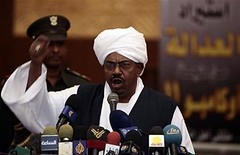
President Omar Hassan al-Bashir has remained defiant in the face of imperialist plots to destabilized the government of Sudan. The ICC recently issued a warrant for his arrest.
Originally uploaded by Pan-African News Wire File Photos
According to report at least 1,500 south Sudanese have fled areas along the north-south borders fearing aerial attacks.
Last Modified: 29 Nov 2010 19:48 GMT
Voter registration for a referendum to decide if the south wants to secede has been extended
At least 1,500 south Sudanese civilians have fled areas along the north–south border fearing aerial attack on Bahr al-Ghazal by the Sudan Armed Forces, the UN and southern officials said.
Giovanni Bosco, the head of the UN office for the coordination of humanitarian affairs in southern Sudan, said on Monday that there was no formal camp set up to receive the new arrivals, but the UN was helping the local community feed them.
"People are leaving their villages because of the military tensions in the area," he said.
Officials in the area say they have received "hundreds" of additional arrivals in just the last few days, and some reports put the number of overall displaced much higher.
"The report we received says 2,500 have been displaced in the area," said southern army (SPLA) spokesman Philip Aguer.
Northern government officials were unavailable for comment on the reports. The SPLA says northern forces are still flying fighter planes along the border to scare southern villagers.
"Khartoum's newly-acquired Chinese planes are flying in the area.
"They are trying to cause terror and disrupt the referendum," Aguer told Reuters.
Voter registration for a referendum in south Sudan to decide whether the oil producing region secedes from the north has recently been extended to end on December 8.
The vote is part of a 2005 peace deal between the dominant parties of the north and south, ending decades of civil war that claimed two million lives.
Relations between north and south Sudan have threatened to boil over in the build-up to the southern vote.
Sudan's economy depends on oil, located mostly in the south, and Khartoum does not want to lose an important source of revenue.
Source: Reuters
No comments:
Post a Comment